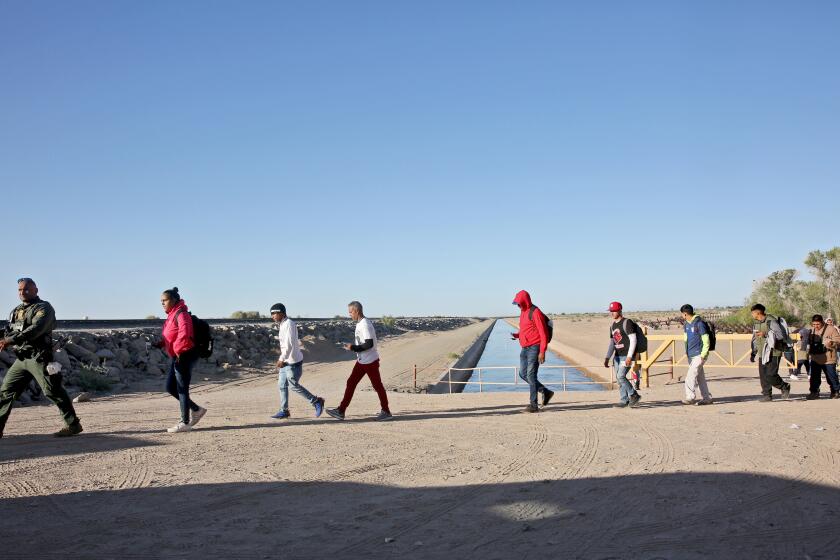Opinion: My client Jose was the luckiest man in an unlucky place. He got to go home for the holidays

The holidays can be a challenging time. Itâs an especially challenging time for detainees at the Adelanto Immigration and Customs Enforcement Processing Center.
This wind-scoured private prison lurks on the western boundary of the Mojave Desert, about 10 miles from Victorville. With a built-in immigration court, itâs something of a one-stop deportation shop.
Sundays are a busy day here. The waiting room at the Desert View Annex is crowded with families. Parents. Grandparents. More children than you would expect. The visitors are nervous, if not resigned.
Instead of busing migrants and doing other stunts, why donât politicians look to the past for policy ideas that could improve our asylum and work permit systems?
A kindly man with a Sinaloan accent makes small talk with me while we wait.
âYou here to visit family?â
âNo. A client.â
âLawyer?â
âYes, in a public defenderâs office.â
âYou do immigration law?â
âNot really. Iâm here to fix the wrongful conviction that took away my clientâs green card and got him put in deportation.â
A shortage of legal pathways to immigration have produced terrible work conditions that pull children into an often dangerous labor force.
He asks for my card. âMy son has a conviction like that too. Can you talk to him?â
The staff here are pleasant, kind. A guard in a blue polo shirt exchanges the IDs of people in the waiting room for visitorsâ badges. Another walks us through a series of imposing steel doors to a visiting room. Some Christmas ornaments hang from the ceiling. Clumps of plastic furniture line the periphery. A play area for children sits on the far wall. A dozen men in red and orange jumpsuits greet the arrivals.
It is palpably sad. All but one or two of these men will be deported; all but one or two of these families will be missing a son or husband or father during the holidays.
A friendly guard with perfect fake eyelashes places me in a private attorney room. I hand her a stack of papers for my client Jose. Across the reinforced glass, tears well in his eyes as he signs the documents mending the legal errors that landed him here.
The former president has a proven record to appeal to the anti-immigrant voters. Rivals should give up trying to pass him on the right.
Jose is in his late 50s. Been in the U.S. as a lawful permanent resident since he was 6 months old. His entire family is here. He has five adult children. Six grandchildren. Elderly parents. Owns a small business. Has no contact with his country of his birth.
In the 1990s, he pleaded guilty to possession of less than a gram of cocaine. His lawyer never asked about his immigration status, nor told him the conviction would result in him losing his green card and being placed in deportation. Not understanding the immigration consequences, he pleaded guilty. He attended some drug classes and when the judge said âcase dismissed,â he thought the matter was closed. But a âdismissedâ case is still a federal controlled substances conviction.
Three decades later, Jose was arrested by men in windbreakers and placed in deportation proceedings.
Last Monday, I was in court for him, and a judge signed an order vacating the conviction because it violated his 5th and 6th Amendment rights. On Tuesday, Joseâs immigration attorney filed a motion to terminate removal proceedings with the judgeâs order attached. With no criminal conviction to trigger deportation grounds, Jose made it home to watch his grandkids tear into presents.
He was the luckiest man in an unlucky place. Had his conviction come from other counties in California, the public defenderâs offices in those counties would very likely have refused to take his case, despite having been allocated money to do so.
In 2021, the California Board of State and Community Corrections created the Public Defense Pilot Program, which provided funds so that public defenderâs offices could represent clients under several statutes, including Penal Code §1473.7. This law allows defendants to vacate criminal convictions if newly discovered evidence appears; if the conviction was obtained on the basis of race, ethnicity or national origin; or if itâs legally invalid because the person did not understand and appreciate the immigration consequences.
Although the other statutes in the pilot program also require a public defenderâs office to open old cases where, almost always, mistakes of some kind will be found, many defenderâs offices resist taking on cases involving immigrants because of workloads or concerns about potential conflicts of interest.
In my office in Ventura County, I was transferred from felony trials to the immigration unit to help as many eligible people as possible. Although this decision significantly increased the officeâs workload, the positive results are tangible. In 2023, we prepared more than 200 §1473.7 cases on behalf of 93 immigrants like Jose.
If every public defenderâs office in the state could make indigent representation under this statute a priority, we would see more justice and many more immigrants, whoâve been unfairly swept up, have an increased opportunity to make it home to their families for the holidays and in the coming year.
Michael Albers is a senior deputy public defender in the Ventura County Public Defenderâs Office.
More to Read
A cure for the common opinion
Get thought-provoking perspectives with our weekly newsletter.
You may occasionally receive promotional content from the Los Angeles Times.













